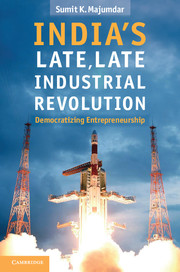Book contents
- Frontmatter
- Contents
- Figures
- Tables
- Acknowledgments
- Preface
- 1 Vent for growth
- 2 Industrial revolutions
- 3 Aspects of Indian enterprise history
- 4 The emergence of modern industry
- 5 Asian late industrialization
- 6 Democratizing entrepreneurship
- 7 Contemporary India
- 8 The services sector debate
- 9 A paean for manufacturing
- 10 Reindustrializing India
- Appendix
- Notes
- Bibliography
- Index
6 - Democratizing entrepreneurship
Published online by Cambridge University Press: 05 June 2012
- Frontmatter
- Contents
- Figures
- Tables
- Acknowledgments
- Preface
- 1 Vent for growth
- 2 Industrial revolutions
- 3 Aspects of Indian enterprise history
- 4 The emergence of modern industry
- 5 Asian late industrialization
- 6 Democratizing entrepreneurship
- 7 Contemporary India
- 8 The services sector debate
- 9 A paean for manufacturing
- 10 Reindustrializing India
- Appendix
- Notes
- Bibliography
- Index
Summary
The tale of a nationalist entrepreneur
This chapter commences with a story. The Bengalis had been inadequate in industrial capabilities, but were not short of nationalist spirit. The first technology entrepreneur in India, motivated by a spirit of national uplift, was Praphulla Chandra Ray, whose achievements we have seen in Chapter 4. On the western side of the country, a remarkable man with nationalist spirit, named Walchand Hirachand, deserves approbation as an inspirational doyen of India’s manufacturing sector in the period prior to the Second World War. His approach, in the first half of the twentieth century, displays the characteristics of a sense of urgency, and an unwillingness to kowtow to other countries’ interests. The latter factor was a psychological component behind India’s tipping-point in 1991.
Born in 1882, Walchand Hirachand belonged to a Gujarati family that had settled in Phaltan, in the Satara district of the Bombay presidency, in the nineteenth century. The family had dropped the surname of Doshi. Phaltan was an important center of cloth, oil, rice, and mango trades. Today, it is an important agriculture center in western Maharashtra. Walchand Hirachand’s father, Hirachand Nemichand, had to give up school and enter business at the age of 14 because his own father had suddenly died. In a decade, he had attracted the attention of Morarjee Goculdas, a textile industry pioneer of Bombay, who had started the Sholapur Spinning and Weaving Mills. By the age of 30, Hirachand Nemichand, who was an agent of several textile mills, had entered the banking sector and accumulated a fortune in bond trading.
- Type
- Chapter
- Information
- India's Late, Late Industrial RevolutionDemocratizing Entrepreneurship, pp. 153 - 185Publisher: Cambridge University PressPrint publication year: 2012



